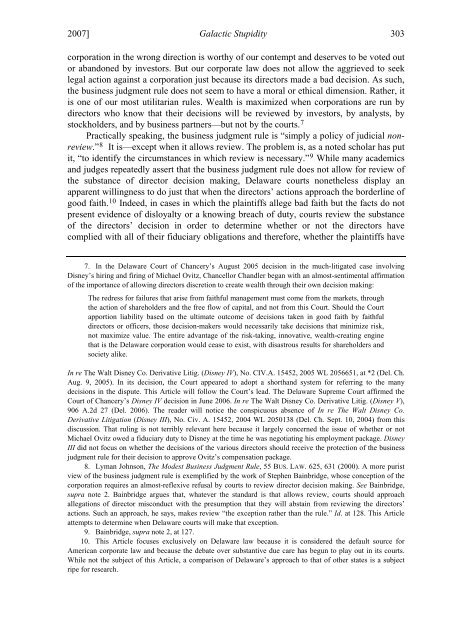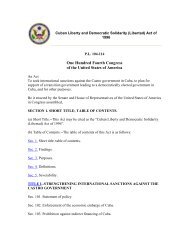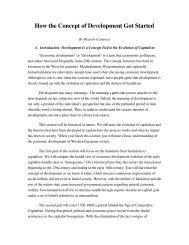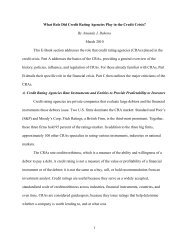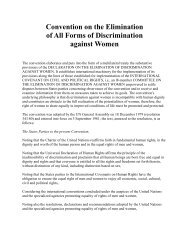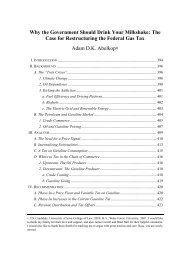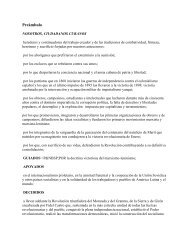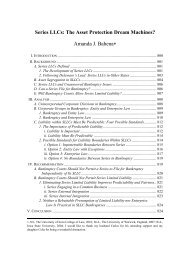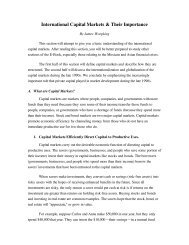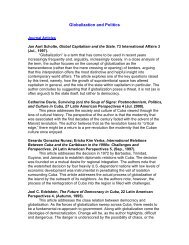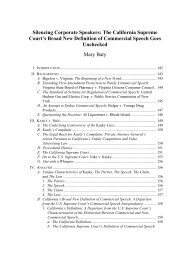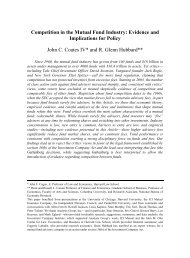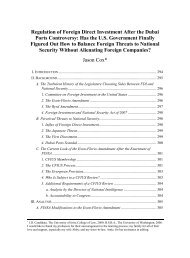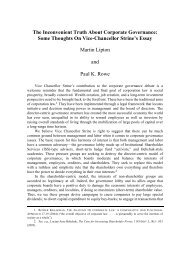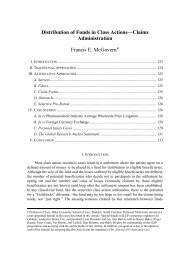Galactic Stupidity and the Business Judgment Rule - College of Law
Galactic Stupidity and the Business Judgment Rule - College of Law
Galactic Stupidity and the Business Judgment Rule - College of Law
You also want an ePaper? Increase the reach of your titles
YUMPU automatically turns print PDFs into web optimized ePapers that Google loves.
2007] <strong>Galactic</strong> <strong>Stupidity</strong> 303<br />
corporation in <strong>the</strong> wrong direction is worthy <strong>of</strong> our contempt <strong>and</strong> deserves to be voted out<br />
or ab<strong>and</strong>oned by investors. But our corporate law does not allow <strong>the</strong> aggrieved to seek<br />
legal action against a corporation just because its directors made a bad decision. As such,<br />
<strong>the</strong> business judgment rule does not seem to have a moral or ethical dimension. Ra<strong>the</strong>r, it<br />
is one <strong>of</strong> our most utilitarian rules. Wealth is maximized when corporations are run by<br />
directors who know that <strong>the</strong>ir decisions will be reviewed by investors, by analysts, by<br />
stockholders, <strong>and</strong> by business partners—but not by <strong>the</strong> courts. 7<br />
Practically speaking, <strong>the</strong> business judgment rule is “simply a policy <strong>of</strong> judicial nonreview.”<br />
8 It is—except when it allows review. The problem is, as a noted scholar has put<br />
it, “to identify <strong>the</strong> circumstances in which review is necessary.” 9 While many academics<br />
<strong>and</strong> judges repeatedly assert that <strong>the</strong> business judgment rule does not allow for review <strong>of</strong><br />
<strong>the</strong> substance <strong>of</strong> director decision making, Delaware courts none<strong>the</strong>less display an<br />
apparent willingness to do just that when <strong>the</strong> directors’ actions approach <strong>the</strong> borderline <strong>of</strong><br />
good faith. 10 Indeed, in cases in which <strong>the</strong> plaintiffs allege bad faith but <strong>the</strong> facts do not<br />
present evidence <strong>of</strong> disloyalty or a knowing breach <strong>of</strong> duty, courts review <strong>the</strong> substance<br />
<strong>of</strong> <strong>the</strong> directors’ decision in order to determine whe<strong>the</strong>r or not <strong>the</strong> directors have<br />
complied with all <strong>of</strong> <strong>the</strong>ir fiduciary obligations <strong>and</strong> <strong>the</strong>refore, whe<strong>the</strong>r <strong>the</strong> plaintiffs have<br />
7. In <strong>the</strong> Delaware Court <strong>of</strong> Chancery’s August 2005 decision in <strong>the</strong> much-litigated case involving<br />
Disney’s hiring <strong>and</strong> firing <strong>of</strong> Michael Ovitz, Chancellor Ch<strong>and</strong>ler began with an almost-sentimental affirmation<br />
<strong>of</strong> <strong>the</strong> importance <strong>of</strong> allowing directors discretion to create wealth through <strong>the</strong>ir own decision making:<br />
The redress for failures that arise from faithful management must come from <strong>the</strong> markets, through<br />
<strong>the</strong> action <strong>of</strong> shareholders <strong>and</strong> <strong>the</strong> free flow <strong>of</strong> capital, <strong>and</strong> not from this Court. Should <strong>the</strong> Court<br />
apportion liability based on <strong>the</strong> ultimate outcome <strong>of</strong> decisions taken in good faith by faithful<br />
directors or <strong>of</strong>ficers, those decision-makers would necessarily take decisions that minimize risk,<br />
not maximize value. The entire advantage <strong>of</strong> <strong>the</strong> risk-taking, innovative, wealth-creating engine<br />
that is <strong>the</strong> Delaware corporation would cease to exist, with disastrous results for shareholders <strong>and</strong><br />
society alike.<br />
In re The Walt Disney Co. Derivative Litig. (Disney IV), No. CIV.A. 15452, 2005 WL 2056651, at *2 (Del. Ch.<br />
Aug. 9, 2005). In its decision, <strong>the</strong> Court appeared to adopt a shorth<strong>and</strong> system for referring to <strong>the</strong> many<br />
decisions in <strong>the</strong> dispute. This Article will follow <strong>the</strong> Court’s lead. The Delaware Supreme Court affirmed <strong>the</strong><br />
Court <strong>of</strong> Chancery’s Disney IV decision in June 2006. In re The Walt Disney Co. Derivative Litig. (Disney V),<br />
906 A.2d 27 (Del. 2006). The reader will notice <strong>the</strong> conspicuous absence <strong>of</strong> In re The Walt Disney Co.<br />
Derivative Litigation (Disney III), No. Civ. A. 15452, 2004 WL 2050138 (Del. Ch. Sept. 10, 2004) from this<br />
discussion. That ruling is not terribly relevant here because it largely concerned <strong>the</strong> issue <strong>of</strong> whe<strong>the</strong>r or not<br />
Michael Ovitz owed a fiduciary duty to Disney at <strong>the</strong> time he was negotiating his employment package. Disney<br />
III did not focus on whe<strong>the</strong>r <strong>the</strong> decisions <strong>of</strong> <strong>the</strong> various directors should receive <strong>the</strong> protection <strong>of</strong> <strong>the</strong> business<br />
judgment rule for <strong>the</strong>ir decision to approve Ovitz’s compensation package.<br />
8. Lyman Johnson, The Modest <strong>Business</strong> <strong>Judgment</strong> <strong>Rule</strong>, 55 BUS. LAW. 625, 631 (2000). A more purist<br />
view <strong>of</strong> <strong>the</strong> business judgment rule is exemplified by <strong>the</strong> work <strong>of</strong> Stephen Bainbridge, whose conception <strong>of</strong> <strong>the</strong><br />
corporation requires an almost-reflexive refusal by courts to review director decision making. See Bainbridge,<br />
supra note 2. Bainbridge argues that, whatever <strong>the</strong> st<strong>and</strong>ard is that allows review, courts should approach<br />
allegations <strong>of</strong> director misconduct with <strong>the</strong> presumption that <strong>the</strong>y will abstain from reviewing <strong>the</strong> directors’<br />
actions. Such an approach, he says, makes review “<strong>the</strong> exception ra<strong>the</strong>r than <strong>the</strong> rule.” Id. at 128. This Article<br />
attempts to determine when Delaware courts will make that exception.<br />
9. Bainbridge, supra note 2, at 127.<br />
10. This Article focuses exclusively on Delaware law because it is considered <strong>the</strong> default source for<br />
American corporate law <strong>and</strong> because <strong>the</strong> debate over substantive due care has begun to play out in its courts.<br />
While not <strong>the</strong> subject <strong>of</strong> this Article, a comparison <strong>of</strong> Delaware’s approach to that <strong>of</strong> o<strong>the</strong>r states is a subject<br />
ripe for research.


